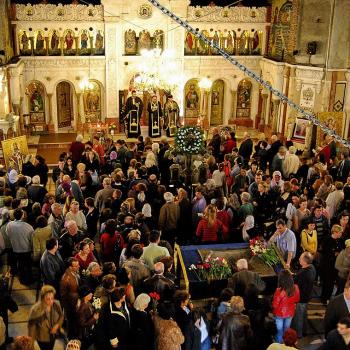
Jesus was clear, those who put on shows, trying to look pious in front of others, do not understand what piety is really about. This is why, when they make rules, obligating others to follow them with their performative piety, they often hinder the spiritual progression, not only of themselves, but others. They frequently base their performative piety on subjective aesthetic appeals, indicating that something they believe is beautiful or aesthetically pleasing must be seen as more righteous, more holy, than actions which are not. This, of course, is not true, as many practices can be beautiful, indeed, aesthetically pleasing, but shallow if not morally questionable. In this way, when they encourage others to follow after them, to engage performative piety, which is focused on secondary (or tertiary) concerns, on externals and accidents rather than of things of substance, they turn people away from the spirituality Jesus would have them follow, where Jesus said that holiness and righteousness comes from what is found within, not what is on the outside (cf. Matt. 15:10-11). Many, following along with such performative piety, end up judging liturgical celebrations merely on externals, using their own particular aesthetic interests as the basis for their judgment. This is why they will recklessly and unjustifiably judge particular liturgical forms as “lesser,” because they are interested only in pomp and circumstances, thinking its presence or lack of presence is what should be used to determine which form of the liturgy is the best. Holiness and piety is internal, not external; it is not something easy to discern in others, even as it would be difficult for others to see it in ourselves. Nonetheless we should not be concerned with what others think, for, as Jesus said: “Beware of practicing your piety before men in order to be seen by them; for then you will have no reward from your Father who is in heaven” (Matt. 6:1 RSV).
Jesus wants us to be honest with ourselves. He wants us to be humble. Such humility, not some false humility which we engage in front of others to make them think we are humble, but humility which is found within, is what leads to holiness. Looking down upon others for not following our preferred spiritual aesthetic is not the way. We are not to be like the those who think they know and do things better than others, for once we think such, we have already lost our spiritual purity. Jesus really wanted us to grasp this, which is why he would constantly find ways to lift up the holiness of those his listeners thought were vile sinners, such as Samaritans, or the tax collector in the story of the Publican and the Pharisee:
He also told this parable to some who trusted in themselves that they were righteous and despised others: “Two men went up into the temple to pray, one a Pharisee and the other a tax collector. The Pharisee stood and prayed thus with himself, `God, I thank thee that I am not like other men, extortioners, unjust, adulterers, or even like this tax collector. I fast twice a week, I give tithes of all that I get.’ But the tax collector, standing far off, would not even lift up his eyes to heaven, but beat his breast, saying, `God, be merciful to me a sinner!’ I tell you, this man went down to his house justified rather than the other; for every one who exalts himself will be humbled, but he who humbles himself will be exalted.” (Lk. 18: 9 – 14 RSV).
The more we exalt ourselves, and our own particular preferences, and use that exaltation to ridicule or condemn others, the further we are from what Jesus told us to be like, and so the further we will be from true holiness. We must understand that we will exalt God more through simple acts of devotion than pompacious worship filled with aesthetic grandeur. Thus, Jesus said:
And when you pray, you must not be like the hypocrites; for they love to stand and pray in the synagogues and at the street corners, that they may be seen by men. Truly, I say to you, they have received their reward. But when you pray, go into your room and shut the door and pray to your Father who is in secret; and your Father who sees in secret will reward you. And in praying do not heap up empty phrases as the Gentiles do; for they think that they will be heard for their many words. Do not be like them, for your Father knows what you need before you ask him (Matt. 6:5-8 RSV).
Those who want to praise God as a way to show their love do not need to put on a show in front of others; indeed, they are not going to be concerned about what others think. What they care to do is show God their love, doing it in the way they believe best suits their own relationship with God. This is why we are encouraged to go deep into the secret chambers of our hearts, where others cannot follow, and embrace God there, praying to God with and through our love, receiving God’s love and grace in return. So long as we think our devotion is something we must show off in front of others so we can be lifted up and praised by them, we have not understood Jesus. Indeed, we risk becoming like clanging gongs, if not worse, as we find ourselves closing ourselves off from God’s love and grace from such self-embrace. Jesus warns us that once we have done that, we might cause ourselves to become accursed: “Woe to you, scribes and Pharisees, hypocrites! for you cleanse the outside of the cup and of the plate, but inside they are full of extortion and rapacity. You blind Pharisee! first cleanse the inside of the cup and of the plate, that the outside also may be clean” (Matt. 26:25 -26 RSV). So many people, especially those who try to promote their own favored liturgical forms, trying to universalize them and suggest they are better than everyone else because of their liturgical preferences, are so focused on accidents, they are like those who clean the outside of the cup and plate while ignoring that what is important is what is found within, beyond all the accidents.
Liturgy is important. Establishing liturgical forms which engage the cultures at large is important. But we must remember, liturgy is a tool, not an end in and of itself. It is meant to help us, not to enslave us; the sabbath is made for us, and so liturgy is made for us. When we abuse it, when we turn particular forms of liturgy into idols, we have strayed from the true purpose of liturgical worship. We must reject such abuse, and to do so correctly we must return to the true spirit and foundation of liturgy, to the worship Jesus with a pure heart, one which is not concerned with externals (though of course, one which will use them when appropriate). We must restore our right relationship with God. What is secondary must remain secondary, and not treated as holding primary importance, while what is primary, which is the simple but pure love God wants from us, should always be at the forefront of our actions, so that in and through it, we will truly become holy, as God is holy.
Stay in touch! Like A Little Bit of Nothing on Facebook.
If you liked what you read, please consider sharing it with your friends and family!













